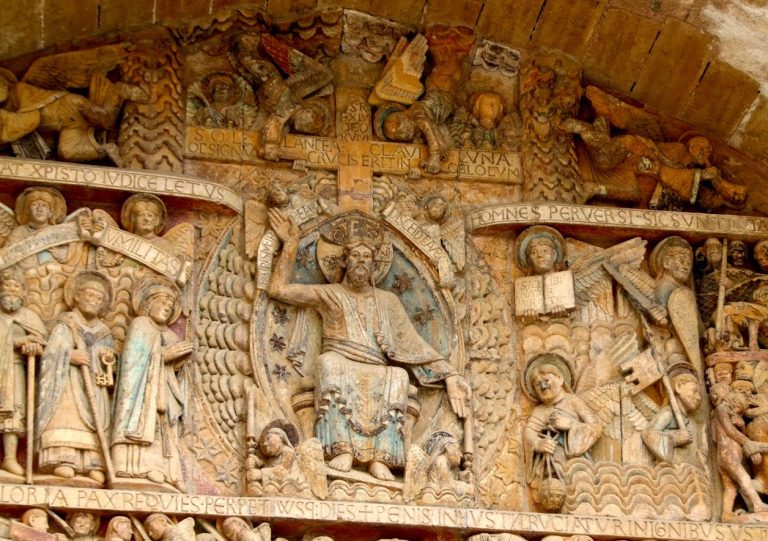Learn how many books the New Testament of the Bible has and what its message is
Knowing how many books the New Testament of the Bible has, can be a very simple answer if we only say a number, but the important thing is to know by whom they were written and the message of each one of them. There are 27 books that narrate the life and work of our Lord Jesus Christ.
How many books does the New Testament of the Bible have?
But let’s get into the topic, how many books does the New Testament of the Bible have? The New Testament is made up of 27 books, which contain the gospels of the life and work of Christ. We must assume that as they contain the accounts of Christ’s life, they were written after his death and resurrection.
There are many branches within Christianity and these are based on the different interpretations that have been made of the scriptures. How many books does the New Testament of the Bible have? One of the first reasons that can give us an answer is that the books that make up the New Testament were originally written in Aramaic and Hebrew, therefore, it is very possible that there are errors. in the translation of the scriptures.
Another reason is the interpretation given to the scriptures, what they meant and what is the message that each of the writers of the life and word of our Lord Jesus Christ wanted to convey. How many books does the New Testament of the Bible support these two reasons that are robust enough to understand that various branches of Christianity have been generated.
Next, after knowing how many books the New Testament of the Bible has, we are going to break down its origin and its messages.
gospel matthew
Matthew was a tax collector, if we can imagine the times surely it is easy to think that a tax collector should be firm, cruel, and indolent. But Mateo abandoned that life to give himself and follow the path of Jesus. This is the first book, it was written by Matthew 80 years after Christ.
It is very important to know that Matthew wrote this gospel for the Jews and that is why he frequently refers to the Old Testament, the intention is to make himself understood and make it clear using these texts that in the life and work of Jesus the design of God.
In this first book, Matthew exposes that Jesus is the Son of David, the envoy, the son of man, the King of Israel and Son of God, he is the suffering servant who bears all our weaknesses and to confirm his character and divine condition. He names him Lord, a title that was only used in the Old Testament to refer to God.
Matthew emphasizes in his gospel the teachings of Jesus where there is a connecting thread as he develops his gospel and it is none other than the Kingdom of God. He presents Jesus as the teacher, he is the authority and justice of the Kingdom.
Men have to congregate, live as brothers and serve with love, these are fundamental conditions that make the true face of Jesus Christ be reflected in that of his servants.
Gospel according to Mark
Mark was Peter’s companion to Rome, from whom he learned the word of God along with Paul. Mark faithfully wrote his teachings and leaves in his gospel the word of Jesus, without the details of his birth or death. His gospel begins with the Baptism of Jesus, praises his teaching and the following of the multitudes.
It also makes it clear that Jesus did not want to be praised for the miracles he was capable of doing, his mission wanted to reach the hearts of men, to be the example and model, but disappointment reaches him. Mark relates in the second part of his book that it takes place in Judea and Jerusalem and ends with the death of Jesus on the cross. (See also: Prayer for a patient who is going to operate )
Gospel according to Saint Luke
Luke was the companion of Saint Paul. Lucas was not Jewish and therefore in his work we can identify that he is directed to Christians. He writes about the importance of preaching and emphasizes the Salvation of man through Jesus Christ, it is God’s desire, without distinction, only the abandoned will have privilege.
If the salvation of lost children has the benefit of mercy, Luke makes it very clear in his gospel that conversion is necessary to achieve Salvation. The Holy Spirit is an inexhaustible source of joy for believers, but you have to have faith in the Good News to be saved.
Gospel according to Saint John
John is recognized as the disciple whom Jesus loved, the gospel itself refers to this close preference. This gospel dates from the year 100 after Christ and is written so that its message would be read preferably by the Christians of Asia Minor.
The message that John wants to deliver through his gospel is that Jesus is the one sent by God. In his beautiful writing he tells us that Jesus gives us the testimony of the Father’s word and the revelation that his life was through the glory received by God.
He shows in his writing that Jesus came into the world to save us, that whoever does not believe in him is condemned to live eternally in darkness, but whoever believes in Jesus has already left death, enters life and has won eternal life for himself.
It deepens in the symbols that allow us to recognize Jesus without even naming him, counts the goods delivered and develops sacramental catechesis. He emphasizes the message and meaning of Jesus’ actions and shows us the way to eternal life.
Acts of the Apostles
The Fifth Book is a compilation that narrates the teaching of Jesus, it is a two-volume work in which rest at least a fourth of the New Testament. The Acts of the Apostles is a sample of the fulfillment that they gave to the mandate of the risen Jesus Christ. Let us remember that before rising to heaven and sitting at the right hand of God the Father, he left those in charge of making his testimony known throughout the world, for this, the Holy Spirit descended.
Lucas begins in Nazareth the journey and teaching of Jesus Christ and makes a detailed description narrated in the first person, which is evidence that he was present in the narrated events. He identifies in the scriptures that the power of the Spirit builds the church through evangelization, this word of God is built in believers who are multipliers, so the church is established further and further.
Letter to the Romans
This sixth book arises from a beautiful mission of the apostle Paul, he was returning from his third trip as a missionary which was a laborious journey through Macedonia and Achaia, charged with delivering favors to the less favored, decides that he must continue evangelizing towards the West, a territory that still he had not been visited with the word and teaching of Jesus Christ.
Wishing to make a preamble in his sight, he writes the Letter to the Romans in which Paul’s maturity in his thought and the words to evangelize become evident. In this beautiful letter to the Romans he tells them about Sin, about the work of Christ, the Law of Moses, Baptism and more.
In it he makes a revelation of the new faith in Christ of the Jewish people, the diversity of the themes contained in the letter to the Romans is what makes it an important part of the books of the New Testament. The richness and depth of its doctrine and the variety of topics covered have given this Charter an exceptional importance within Christianity.
Corinthians 1 and 2
For the time, the letters began with the details of who wrote and concluded for whom it was written, this allows Corinthians to know the history of Paul, as he was so closely linked to the Corinthian city where he founded a church. He makes it very clear that he is an apostle.
Corinth was a very populated and developing city, there was a government, businesses, sports centers. Corinthians was destroyed and rebuilt by Julius Caesar. Paul presents himself as an apostle by the will of God, he describes what an apostle of Jesus Christ is.
Corinthians was a city of little morals, licentiousness, drunkenness were part of the life of its inhabitants, they were weak in their doctrine, disobedient, unhelpful and despite this, they were called saints, because God recognized that he had a lot of people in that city. city, it was a compromise.
Corinthians 2 is the word of God for the creation of the church of God in Corinth. Jesus is spoken of in every verse. Paul strengthens in his writing the healing of the Corinthians and this will be achieved by placing his gaze on Jesus.
Letter to the Galatians
Paul fell ill on an evangelizing trip and had to remain in Galatia. Everything in life has a purpose that is directed by God and this is a testimony. There were Christian preachers in Galatia who disturbed the true reading of the word, to be a child of God you do not have to feel suffering.
The Judaizing preachers made evangelization difficult because they were very dissimilar. Paul speaks of the freedom of Christianity without submitting to the Law, indicating that salvation is only achieved by having faith and believing in Jesus Christ.
Letter to the Ephesians
The letter of the Ephesians describes in detail how God created a plan to be executed through Jesus Christ and the Church, where a call is made that this plan must be part of all the actions of life. The power and control of Christ over the entire universe and the church is indicated not as an institution, but as the union of man in evangelization as an instrument that serves Christ to accomplish his work of salvation.
The Letter of the Ephesians indicates the clear union that must be created between Jews and pagans as a single people, the union of all of them being their own temple, built by the help and strength of the Holy Spirit. (See also: Prayer to put a person having a nervous breakdown to sleep )
Letter to the Philippians
The letter of the Philippians comes from the Apostle Paul, in gratitude for the help received by his Philippi friends. Paul maintained a close and trusting relationship with this Christian community. A characteristic of the apostle Paul was not to accept financial help in his evangelizing trips, however, from this close and beloved community on some occasion he accepted his help.
When Paul writes the letter addressed to the Philippians, it was in gratitude at a time of difficulty in which the Christian community was present. The letter is very familiar and in it he exhorts the Philippians to strengthen their faith, not to allow disunity, to become strong in the word of Jesus Christ and not allow the hatred of their enemies to affect them.
Colossians
In this book, Pablo writes in which he develops several aspects aimed at ethics. The strength of his writing is that he spins from the individually focused aspects, then refers to family, home, work, and the way in which we must relate to and treat others. It is evidenced in the scriptures that we will never be alone and that God through his son Jesus Christ will always provide us.
He is explicit in pointing out that men and women of faith cannot allow themselves to be deceived and diverted from the path of Christ by the banal things of the world of man. It teaches us that God is mercy, humility, patience, forgiveness and if we all clothe ourselves with the virtues of God shown in Christ we will be able to forgive each other, tolerate each other and more.
The intention of this book was to eliminate the heresy that existed in Colossae through the sufficiency of Christ our Lord in our lives. It is our attention that must always be careful not to stray from the path that exalts Christ. Only Christ guides us to meet God and that is why we cannot allow ourselves to be deceived by other types of paths that do not lead to God.
First Letter to the Thessalonians
We must remember that these scriptures are the result of the experiences and needs identified by the apostles on their evangelistic journeys. This 13th book stems from Paul’s second evangelistic journey to the capital of Thessalonica, a Roman province of Macedonia.
Paul founded a Christian community, however, despite having followers converted to the Christian faith, he also received strong resistance from the Jews and had to hastily withdraw from the city. Of course Paul left worried about the fate of his Christian community, however, at the time he received good news from her, they had remained in the Christian faith, but they had many concerns for those who had left this plane.
To respond to their concerns, Paul writes this first letter addressed to the Thessalonians in which he clarifies that Jesus together with the angels from heaven will show his power. That you always have to work for salvation and sanctification and those who do not serve the Lord do not have that right.
Second Letter to the Thessalonians
Paul writes a second letter addressed to the church in Thessalonica where he acknowledges their work, praises them and encourages them to stay away from those who do not live in the doctrine of the gospel. He talks about the end of time and that we have to keep ourselves in service far from idleness and teaches them to pray for others.
Timothy I
The story tells of Timoteo as a fatherless boy who was raised by his mother Loida and his grandmother Eunice, they educated him as a Jew, but Timothy as he grew and matured was recognized with capacity for the ministry.
Paul in his evangelization trips recognized that ability and Timothy was his companion for more than 15 years, while Paul wrote his letters, Timothy was with him, he was his collaborator, friend and an innate leader who accompanied Paul, one of the apostles most famous in Christian history.
In this close relationship between Paul and Timothy and in the clear identification of Timothy as a Christian leader, Paul writes to him exhorting him to follow the church of Ephesus and extend his preaching and accompaniment to the churches of the province of Asia. He was requesting that he guide all the common people. It is an explanatory scripture of organization and administration of the church.
Paul asks Timothy in this first letter to remain very attentive to false prophets and in detail indicates how pastoral conduct should be. He clearly points out that if someone wants to be a bishop he must be the husband of one woman and have moral values to be able to teach. An important calling of Paul is respect for elders regarding their entry into the church as being worthy. It is required reading for anyone who feels God’s call and wants to assume leadership in a church.
Timothy II
The Apostle Paul was once again imprisoned in Rome and shortly before he was sentenced to death, he wrote Timothy II, approximately 67 years after Christ. Even with the uncertainty of how long he would be alive, Paul manifested in his writings his special attention to Timothy giving continuity to the strengthening of the church.
In this scripture Timothy insists to preach the word at all times, that no matter how tired he is, he must not lose faith, that he insist. In his writing you can feel his faith when he assures and recognizes that he has fought battles but he keeps a crown of justice that will be imposed by the Lord.
He insists Timothy to remain faithful in the doctrine, not to fear, prophetically he lets him know that difficult times of persecution will come but those who stay away from the vile, from the immoral and cling to their Christian faith will culminate strengthened, recognized and rewarded in heaven through Jesus Christ.
Letter to Titus
It is one of the scriptures that, due to the date of its writing, seems to have been written after the sending of the Letter to the Romans. As we know, by that date Paul had already decided to go to evangelize the western territory of the empire, with special attention to Spain, considered by the apostle as a virgin territory.
But Paul’s plans were interrupted because he was imprisoned in Jerusalem and after several years he was taken to Rome to stand trial. This scripture is addressed to the elders or presbyters and pastors of the church. The call to Christians to respect the obligations according to their place in society, to be submissive to authority. In it he notes his next meeting with Titus at Nicopolis, on the coast of western Greece.
Letter to Philemon
It is a beautiful writing by Paul who was in prison at the time of its writing. The love for his Christian brothers and his dedication to always guide them on the right path and honor the word of God in his actions.
Filemon was touched by Paul’s evangelizing word and became a Christian creating a church in his house, however, Filemon had a slave, who in a desperate act steals him to flee to Rome, where he meets Paul and converts. to Christianity. This slave was called Onesimus, Paul writes to Philemon to receive Onesimus upon his return, but urges him to receive him as a Christian brother and not as a slave.
It is one of the passages in the New Testament where the difference between grace and law is so beautifully shown. Philemon was within his rights to reprimand and punish the slave, but the grace of God directed through Jesus stands before the law and allows a treatment of Christian brothers. (See also: Prayer to God to forget a love that does you no good)
Letter to the Hebrews
Let us recognize for the time of the apostles the Hebrews as the Jews of Palestine, the letter is addressed to them. This community was left with nothing in the world, they were persecuted, exiled. They kept their faith in the son of God and encouraged each other to find the promised land.
This letter is addressed to the priests who knew the Old Testament well and by recognizing the son of God as Christ they should be guided in the word and help them understand that the sacrifice was of Jesus.
They had to be led to understand that Christ is the new Temple, the way that leads men before God. The letter guides them to understand that everything transcended that the Temple of Jerusalem was only a way to emulate something much bigger. Jesus the son of God is the one who through his sacrifice and his glory is the only authentic priest.
Currently the Hebrews are reflected in those people who lose hope, in the persecuted, in those who are not capable of seeing injustice, they are the Hebrews of our days and reading these scriptures will guide them along the path of the word and the teaching of our Lord.
Santiago letter
Santiago converts to Christianity after the resurrection of Jesus Christ. The scriptures are addressed to the Christian Jews who were scattered among the various nations.
Santiago seeks to strengthen the Christian faith of the Jews, he guided them through good deeds in recognition of his Spirit, but he also points out those in which the spirit is not present in their faith or in their actions. (See also: Prayer for a Seriously Sick Family Member to Heal )
In the writing of Santiago, the path of faith is clearly described, it clearly shows how faith is present through actions and social justice, making it clear that these are the representations of the same faith in action.
It makes it very clear that the accumulation of wealth and the self-sufficient are away from the doctrine, but those believers who look at them must be strong in suffering, making use of prayer and taking care of one another. The book of Santiago focuses on the fact that the faithful must have a strong faith that will be reflected in the coherence that exists between the word and the actions.
Peter I
This scripture is addressed to the persecuted, those Christians who were forced to flee and be scattered throughout the world. Peter knew of mistreatment, of persecution like the other apostles who were punished and locked up for preaching the word of God.
Pedro knew very well how faith could be broken and that was the intention of those who persecuted them. He learned to be strong in faith, not to allow despair and suffering to stain his faith.
He recognized in the Christian people that they had persecuted the chosen ones, those who made up the holy nation, those who heard the call to come out of darkness and walk the path of light.
He pointed to the suffering of Christ as the example of the one who healed all our sins, that suffering should be seen with joy because it allows us to recognize the love of Christ, who suffered on the cross for the love he felt for each of his children.
By sharing his sufferings and strengthening ourselves in faith we identify with our Lord, it is nothing compared to the suffering of Christ, keeping you on the path of the word of God, will allow the joy of eternal life.
Peter II
This scripture calls attention to false prophets and the need for Christians to strengthen their ties of faith in order to identify them and reject the false gospel that was entering the church.
The great and powerful promises of the Lord must be the strength of our faith by which we are protagonists of the divine, strengthening faith, not believing in false testimonies will make the wait short, because the Lord does not want any of his children to perish and therefore wait patiently for repentance.
The Words of Peter request to be strong in faith and shows the characteristics of false prophets, where he points out the behavior of false ones and gives Christians the strength that awaits the second coming of Christ, that hope will make them remain in the right path and along the way grow in the grace of God.
John I
The book was written approximately between the years 85 and 95 after the resurrection and glory of Christ. John confronts nosticism through his writing, which was a religious doctrine attached to the esoteric, made Christians believe that they would intuitively have knowledge of the divine and this would lead them to their salvation.
He writes that by confessing sins, we will be forgiven, because he just, makes them know that they are children of God, highlights that believers in Jesus Christ have eternal life. The letter of John guides Christians to recognize themselves as true Christians, followers of the word.
It teaches them that seeing their actions they will be able to recognize themselves as worthy children of God, if their lives were guided by love, solidarity, they were in the presence of God. Following the word of God will allow us to identify our sins and ask for forgiveness for them, correct the actions that had harmed others.
He clearly describes in his writing the first sin, disobedience. The book of John teaches us to identify the difference between joy and happiness, happiness achieved momentarily and joy achieved permanently as a reward for leading a life of love, solidarity, and commitment. (See also: Prayer for my alcoholic husband .)
John II
In his second scripture, John reaffirms the need for Christians to remain in obedience to the scriptures, it is practically a plea for believers to remain attached to the word. He writes the need to love each other, it is the basis of the church to show love for God and that of his only son Jesus of him. He makes a reminder that those who turn away from doctrine also turn away from God.
He warned that the false prophets spoke of a spiritual resurrection of Jesus and not of a resurrection of the flesh. The Christians had to be very vigilant and Juan insisted on his warning. Love is obedience to the word and the word is clearly written in each of the commandments.
John III
This third and last letter from Juan is written in such a way that his word reaches three different recipients, whose differences allowed Juan to praise, warn and show behaviors to correct or reply to them.
Gaius is one of those recipients, he was the leader of a ministry that served to welcome traveling evangelizers, in his writing he thanks Gaius and encourages him to continue his work, which allows the Gospel of Christ to go further and further. He also commends Demetrius for bearing witness to him as the word of God.
He warns of the conduct of those church leaders whose behavior is contrary to what the evangelizers trained by John should have, he refers to unacceptable autocratic behavior in Christian churches. It was actually a message to Diotrephes, who went into disobedience by denying John’s teaching.
John emphasizes in his writing the need to stay on the path of the word of the Gospel, support us, give us encouragement, be supportive. He highlights the fact of following a good example and moving away from those who do not have a behavior like the one that our Lord Jesus Christ taught us.
Judas
Judas made a writing for the end of times, it is a writing directed for the moment in which believers wish to abandon religion, the church. He makes the call not to be guided by false evangelizers who endanger the church with evil desires, the doctrine of the word for them are lacking in spirit.
Faith is all the Christian doctrine delivered by Jesus to his apostles, which is in danger from the false, so it calls for confronting and resisting by faith, by doctrine. It is a spiritual war, a war against false doctrines, a war against sacrifices and flatterers.
Authentic faith will always be present in our behavior, which will always be similar to that of Christ our Lord. Knowing our submissive interior before God, before his authority, we are on trial and we must approach him to win the battle.
Apocalypse
This last book written by John is the revelation of the mysteries of a final judgment, in which we will be judged. The apostle in his writing allows us to recognize the glory of heaven, which is reserved only for those who remained on the path and the doctrine of Jesus Christ, the only path to reach the glory of God and eternal life.
It also shows the fate of those who preferred to follow the path away from good, for never having believed or losing their faith along the way, who will go down to hell and live there forever. (See also: Prayer for the terminally ill )
God is patient and merciful, Jesus Christ waits for the repentance of his children because he loves them and wants eternal life for them, the call of the apostles has been to follow the doctrine, be consistent with the word and actions, strengthen ourselves in the faith.
But the return of Christ will be preceded by the last days of earth and heaven that we know. Apocalypse is the end of the prophecies, this book brings together the prophecies of Daniel, Zechariah, Ezekiel and Isaiah. We must be an example and a model to follow, that our joy be remarkable so that everyone wants to join us, accept Jesus Christ as our Savior and thus not fear because we will have eternal life.
The apostles knew Christ and through his word we can all be close to him and maintain a close relationship with our Lord Jesus Christ. The gospel is written on realities, his word and teaching was written by these men who loved him and believed in him and dedicated their lives to evangelizing.
Jesus Christ is present in each one of those who believes in him, who adheres to his doctrine, who is obedient to his word and consistent in his actions. To the extent that each one of us Christians is the image and likeness of Christ, he will be present among us.
We should only be able to imagine a world full of brothers, who care for each other, who love each other for being the image and likeness of Christ, a world full of mercy, tolerance, solidarity. At that moment we will feel that Jesus walks among us and the joy and grace of God will always accompany us. We already know how many books the New Testament of the Bible has and its content, now we will talk a little about how they are divided in the New Testament.
How are they divided?
The New Testament as we already know is made up of 27 books, written by the apostles, after the death and resurrection of Christ, therefore, they are based on the life experience of the apostles with Jesus, who came to earth to live among us, and these scriptures are irrefutable proof of his existence, sacrifice, death and resurrection. The books of the New Testament are divided into:
the 4 gospels
These four books are considered the most important books that make up the New Testament, since they narrate the life of Jesus from the moment of his birth, death and resurrection.
These gospels were written by Matthew, Mark, Luke and John. Each one of them individually and without having contact with each other wrote a part of the life of Jesus. They are the holy books.
23 later books
The rest of the written Books that make up the New Testament are classed together because they tell the story of Christianity. The path traveled by the apostles in their evangelization is compiled in these 23 books in an epistolary way. The letters have in detail from where and by whom they were written and to whom they were addressed.
Each of the letters sent are messages that teach Christian doctrine and strengthen it in the evidence of the life, death and glory of our Lord Jesus Christ. They show the experiences of life in his close relationship with Jesus, thus showing us the path to Salvation.
Importance of the New Testament
How many books the New Testament of the Bible has is important information to handle in order to understand its content, its origin and also its importance. The importance of the New Testament lies in the fact that these books tell of the lived experience of those who had the opportunity and grace to live with Jesus and follow his word. They wrote about the life and work of the son of God.
There is no doubt about what is written, there is evidence and witnesses, that is why the relevance of these 27 books that make up the New Testament. Each Book has its importance and its particular teaching. Currently translated into more than 200 languages and dialects, the fight of faith that the first Christians undertook to evangelize and fight against persecution, the inquisition and more, bore fruit. Today Christ is closer to us thanks to his sacrifice.
Relationship with religion
There is a revelation in the Books of the New Testament, the apostles speak of a being of love, mercy, justice. There are many branches where religions teach their followers that will allow them salvation and eternal life.
However, by reading the books of the New Testament we can recognize the greatness and wisdom of our Lord. Knowing how many books the New Testament of the Bible has, shows us that in each one of them we can identify that we are in the presence of a Being of love, of forgiveness and never of condemnation, therefore, this must be interpreted that there are no more religions. important or at higher levels than others.

Hello! Let me enthusiastically introduce myself as a dedicated blogger fueled by an intense passion for meticulously crafting insightful and well-researched blogs. My mission revolves around providing you, dear readers, with a veritable treasure trove of invaluable information.







